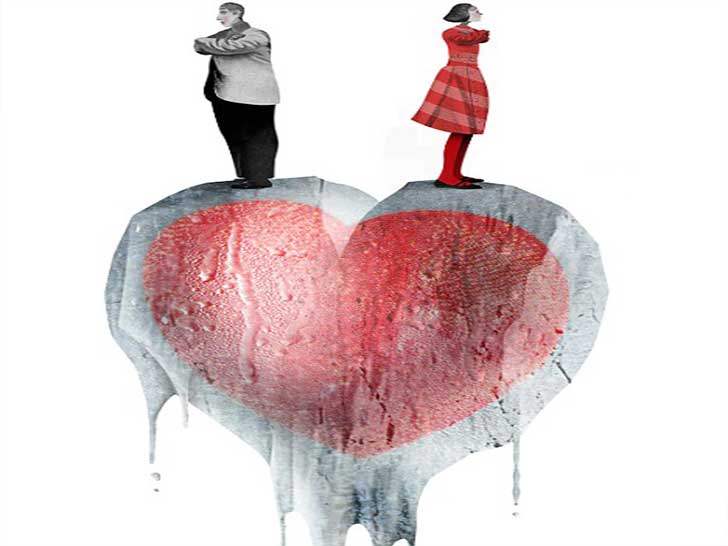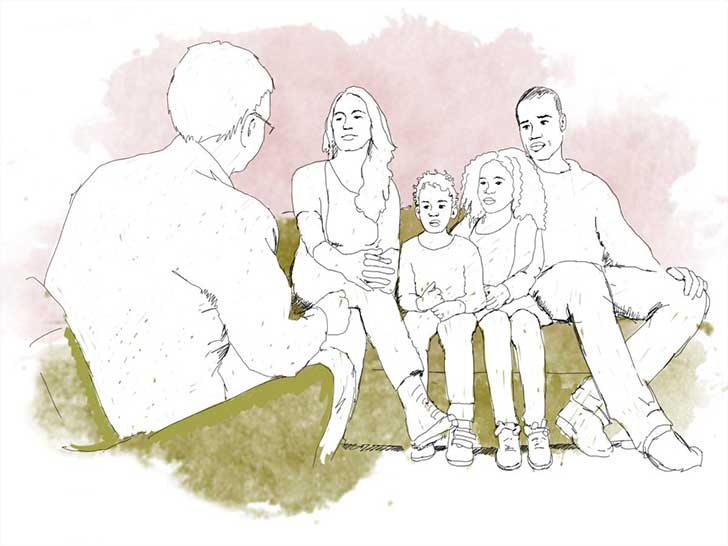اخبار روانشناسی ندای مهر
Stephenson Multigroup Acculturation Scale (SMAS) Below are a number of statements that evaluate changes that occur when people interact with others of different cultures or ethnic groups. For questions that refer to COUNTRY OF ORIGIN or NATIVE COUNTRY‚ please refer to the country from which your family originally came. For questions referring to NATIVE LANGUAGE‚ please refer to the language spoken where your family originally came. Circle the answer that best matches your response to each statement False‚ Partly false‚ Partly true‚ True 1. I understand English‚ but I am not fluent in English. 2. I am informed about current affairs in the United States. 3. I speak my native language with my friends and acquaintances from my country of origin. 4. I have never learned to speak the language of my native country. 5. I feel totally comfortable with (Anglo) American people. 6. I eat traditional foods from my native culture. 7. I have many (Anglo) American acquaintances. 8. I feel comfortable speaking my native language. 9. I am informed about current affairs in my native country. 10. I know how to read and write in my native language. 11. I feel at home in the United States. 12. I attend social functions with people from my native country. 13. I feel accepted by (Anglo) Americans. 14. I speak my native language at home. 15. I regularly read magazines of my ethnic group. 16. I know how to speak my native language. 17. I know how to prepare (Anglo) American foods. 18. I am familiar with the history of my native country. 19. I regularly read an American newspaper. 20. I like to listen to music of my ethnic group. 21. I like to speak my native language. 22. I feel comfortable speaking English. 23. I speak English at home. 24. I speak my native language with my spouse or partner. 25. When I pray‚ I use my native language. 26. I attend social functions with (Anglo) American people. 27. I think in my native language. 28. I stay in close contact with familymembers and relatives inmynative country. 29. I am familiar with important people in American history. 30. I think in English. 31. I speak English with my spouse or partner. 32. I like to eat American foods. Copyright (1998) by Margaret Stephenson. This instrument may be reproduced with permission from Margaret Stephenson. http://biculturalism.ucr.edu/pdfs/Huynh%20et%20al_JCCP2009.pdf
|
|
||||||||||||||||||||||||||||||||||||||||||||||||||||||||||||||||||||||||||||||||||||||||||||||||||||||||||||||||||||||||||||||
|
INDIVIDUALISM and COLLECTIVISM measures
Daphna Oyserman
The University of Michigan
Brief measures of individualism and collectivism were published in:
Oyserman‚ D. (1993). The lens of personhood: Viewing the self‚ others‚ and conflict in a multicultural society. Journal of Personality and Social Psychology‚ 65‚ 993-1009.
To what extent do you agree with each of the following statements
A number of publications use a longer form of IND and COL measure‚ for a review see:
Oyserman‚ D.‚ Coon‚ H.‚ & Kemmelmeier‚ M. (2002). Rethinking individualism and collectivism: Evaluation of theoretical assumptions and meta-analyses. Psychological Bulletin‚ 128‚ 3-73.
Oyserman‚ D. & Lauffer‚ A. (2002). Examining the implications of cultural frames on social movements and group action. In L. Newman and R. Erber (Eds.)‚ What social psychology can tell us about the Holocaust: Understanding the perpetrators of genocide. (pp.162-187). New York‚ NY: Oxford University Press
The scale is set up to assess separately subscales associated with individualism and collectivism (sense of common in-group fate‚ familialism‚ interrelatedness‚ valuing personal uniqueness‚ valuing personal freedom and happiness‚ valuing personal achievement).
The items used to construct each scale are listed below. The items themselves are presented on the next page.
Please circle the number that best describes how much you agree with each statement.
|
|
|
||
|
Authoritarianism-Rebellion Scale (Kohn‚ 1972)
Circle the number that best reflects your degree of agreement or disagreement with each statement. 1. Obedience and respect for authority are the most important virtues children should learn. Disagree Disagree Disagree Agree Agree Agree
Strongly Somewhat Slightly Slightly Somewhat Strongly 1 2 3 4 5 6
2.* What we need least is an authority to tell us what to do or how to do it. Disagree Disagree Disagree Agree Agree Agree
Strongly Somewhat Slightly Slightly Somewhat Strongly 1 2 3 4 5 6
3. Every person should have complete faith in some supernatural power whose decisions he obeys without question. Disagree Disagree Disagree Agree Agree Agree
Strongly Somewhat Slightly Slightly Somewhat Strongly 1 2 3 4 5 6
4. People can be divided into two distinct classes‚ the weak and the strong. Disagree Disagree Disagree Agree Agree Agree
Strongly Somewhat Slightly Slightly Somewhat Strongly 1 2 3 4 5 6
5.* To be a decent human being‚ follow your conscience regardless of the law. Disagree Disagree Disagree Agree Agree Agree
Strongly Somewhat Slightly Slightly Somewhat Strongly 1 2 3 4 5 6
6.* No principle is more immoral than that of obedience. Disagree Disagree Disagree Agree Agree Agree
Strongly Somewhat Slightly Slightly Somewhat Strongly 1 2 3 4 5 6
7. Familiarity breeds contempt.
Disagree Disagree Disagree Agree Agree Agree
Strongly Somewhat Slightly Slightly Somewhat Strongly 1 2 3 4 5 6
8.* Astrology will never explain anything because it is a fraud. Disagree Disagree Disagree Agree Agree Agree
Strongly Somewhat Slightly Slightly Somewhat Strongly 1 2 3 4 5 6
9.* The Canadian way of life is so resistant to progress that a revolution is necessary to end its injustices and oppressions. Disagree Disagree Disagree Agree Agree Agree
Strongly Somewhat Slightly Slightly Somewhat Strongly 1 2 3 4 5 6
10. Nowadays‚ when so many different kinds of people move around and mix together so much‚ a person has to protect himself against catching an infection or disease from them. Disagree Disagree Disagree Agree Agree Agree
Strongly Somewhat Slightly Slightly Somewhat Strongly 1 2 3 4 5 6
11.* Children don=t owe their parents a thing. Disagree Disagree Disagree Agree Agree Agree
Strongly Somewhat Slightly Slightly Somewhat Strongly 1 2 3 4 5 6
12.* Canada can=t exert moral leadership among nations until it abandons its corrupt material nature. Disagree Disagree Disagree Agree Agree Agree
Strongly Somewhat Slightly Slightly Somewhat Strongly 1 2 3 4 5 6
13.* Sex crimes like rape and child molesting reflect a sick society and we must change society rather than punish individual offenders. Disagree Disagree Disagree Agree Agree Agree
Strongly Somewhat Slightly Slightly Somewhat Strongly 1 2 3 4 5 6
14. Obedience is the mother of success. Disagree Disagree Disagree Agree Agree Agree
Strongly Somewhat Slightly Slightly Somewhat Strongly
1 2 3 4 5 6
15. Strong discipline builds moral character. Disagree Disagree Disagree Agree Agree Agree
Strongly Somewhat Slightly Slightly Somewhat Strongly 1 2 3 4 5 6
16. Canada is spiritually predestined to lead the world. Disagree Disagree Disagree Agree Agree Agree
Strongly Somewhat Slightly Slightly Somewhat Strongly 1 2 3 4 5 6
17. Some day it will probably be shown that astrology can explain a lot of things. Disagree Disagree Disagree Agree Agree Agree
Strongly Somewhat Slightly Slightly Somewhat Strongly 1 2 3 4 5 6
18.* Peoples of different nationalities‚ social classes and races should mix together more. Everybody would benefit from it. Disagree Disagree Disagree Agree Agree Agree
Strongly Somewhat Slightly Slightly Somewhat Strongly 1 2 3 4 5 6
19.* To know people well is to love them. Disagree Disagree Disagree Agree Agree Agree
Strongly Somewhat Slightly Slightly Somewhat Strongly 1 2 3 4 5 6
20. The true Canadian way of life is disappearing so fast that force may be necessary to preserve it. Disagree Disagree Disagree Agree Agree Agree
Strongly Somewhat Slightly Slightly Somewhat Strongly 1 2 3 4 5 6
21. Sex crimes‚ such as rape and attacks on children‚ deserve more than mere punishment: Such criminals ought to be publicly whipped or worse. Disagree Disagree Disagree Agree Agree Agree
Strongly Somewhat Slightly Slightly Somewhat Strongly 1 2 3 4 5 6
22.* Obedience is the mother of enslavement. Disagree Disagree Disagree Agree Agree Agree
Strongly Somewhat Slightly Slightly Somewhat Strongly 1 2 3 4 5 6
23.* True morality only develops in a fully permissive environment. Disagree Disagree Disagree Agree Agree Agree
Strongly Somewhat Slightly Slightly Somewhat Strongly 1 2 3 4 5 6
24. There is hardly anything lower than a person who does not feel a great deal of love‚ gratitude‚ and respect for his parents. Disagree Disagree Disagree Agree Agree Agree
Strongly Somewhat Slightly Slightly Somewhat Strongly 1 2 3 4 5 6
25. No principle is more noble or holy than that of true obedience. Disagree Disagree Disagree Agree Agree Agree
Strongly Somewhat Slightly Slightly Somewhat Strongly 1 2 3 4 5 6
26.* The strong and the weak are not inherently different. They are merely the advantaged and the disadvantaged members of an unfair society. Disagree Disagree Disagree Agree Agree Agree
Strongly Somewhat Slightly Slightly Somewhat Strongly 1 2 3 4 5 6
27.* Obedience and respect for authority aren=t virtues and shouldn=t be taught to children. Disagree Disagree Disagree Agree Agree Agree
Strongly Somewhat Slightly Slightly Somewhat Strongly 1 2 3 4 5 6
28. To be a decent person‚ always stay within the law. Disagree Disagree Disagree Agree Agree Agree
Strongly Somewhat Slightly Slightly Somewhat Strongly 1 2 3 4 5 6
29. Our chief want in life is somebody to make us do what we should. Disagree Disagree Disagree Agree Agree Agree
Strongly Somewhat Slightly Slightly Somewhat Strongly 1 2 3 4 5 6
30.* Faith in the supernatural is a harmful self-delusion‚ and submission to religious authority is dangerous. Disagree Disagree Disagree Agree Agree Agree
Strongly Somewhat Slightly Slightly Somewhat Strongly 1 2 3 4 5 6
Note: Items marked with an asterisk are reverse-scored items. References
Kohn‚ P.M. (1972). The Authoritarianism-Rebellion scale: A balanced F Scale with left-wing reversals. Sociometry‚ 35‚ 176-189.
http://www.yorku.ca/rokada/
|
|
|
||||||||||||||||||||||||||||||||
|
Racial-Ethnic Identity and Racial-Ethnic Self Schemas Daphna Oyserman‚ University of Michigan
Email: این آدرس ایمیل توسط spambots حفاظت می شود. برای دیدن شما نیاز به جاوا اسکریپت دارید
SCALE
OPEN-ENDED (example is for African American‚ for other groups‚ use relevant terms)
People use different words to describe themselves‚ which of the following best describes you and people who look like you?
1. African American
2. Black
3. Mixed; parents are from different groups. If so‚ which: _______________and _____________
4. Other (write in ): _____________________.
When you think of yourself‚ you would most likely use the term _____________ (write in from the list above) to describe your racial or ethnic group.
Describe what it means to you to be an African American (or relevant group):
_______________________________________________________________________________
_______________________________________________________________________________
_______________________________________________________________________________
_______________________________________________________________________________
What are the everyday things you do that make you feel like an African American (or relevant group):
_______________________________________________________________________________
_______________________________________________________________________________
Think about yourself as a male or female‚ what does it mean to be an African American male or female (or relevant group)? _______________________________________________________________________________
_______________________________________________________________________________
_______________________________________________________________________________
_______________________________________________________________________________
Does it make a difference to others that you are an African American (or relevant group)? If so‚ can you tell me in what ways it makes a difference?
_______________________________________________________________________________
_______________________________________________________________________________
_______________________________________________________________________________
_______________________________________________________________________________
How important is it to you to be an African American (or relevant group)?
_______________________________________________________________________________
_______________________________________________________________________________
_______________________________________________________________________________
FOR CONTENT CODING INFORMATION SEE:
Oyserman‚ D.‚ Gant‚ L. & Ager‚ J. (1995). A socially contextualized model of African American identity: Possible selves and school persistence. Journal of Personality and Social Psychology‚ 69‚ 1216-1232 (RACIAL-ETHNIC IDENTITY SUBSCALES)
Oyserman‚ D.‚ Kemmelmeier‚ M.‚ Fryberg‚ S.‚ Brosh‚ H.‚ & Hart-Johnson‚ T. (2003). Racial-ethnic self-schemas. Social Psychology Quarterly‚ 66‚ 333-347 (RACIAL-ETHNIC SCHEMAS).
CLOSE-ENDED RACIAL-ETHNIC IDENTITY
(example is for African American‚ for other groups‚ use relevant terms)
People have different opinions about what it means to be African American‚ I will read some statements to you. For each one‚ say how close it is to your opinion using the following scale‚ where 1= strongly disagree; 2=disagree; 3=neither agree nor disagree; 4= agree; 5=strongly agree.
ETH1) It is important to me to think of myself as an African American.
ETH2) I feel that I am part of the African American community
ETH3) I have a lot of pride in what members of the African American community have done and achieved.
ETH4) I feel close to others in the African American community.
ETH5) If I am successful it will help the African American community.
ETH6) It is important for my family and the African American community that I succeed in school.
ETH7) Some people will treat me differently because I am African American.
ETH8) As an African American‚ the way I look and speak influences what others expect of me.
ETH9)Things in the African American community are not as good as they could be because of lack of opportunity.
ETH10) It helps me when others in the African American community are successful.
ETH11)People might have negative ideas about my abilities because I am an African American.
ETH12) If I work hard and get good grades‚ other African Americans will respect me.
CODING
Embedded achievement (items 5‚ 6‚ 10‚ and 12)
Connectedness (items 1-4)
Awareness of racism (items 7‚ 8‚ 9‚ and 11)
RELIABILITY
Oyserman‚ D.‚ Brickman‚ D.‚ & M. Rhodes (2007). Racial-ethnic identity in adolescence: Content and consequences for African American and Latino youth. In. A. Fuligni (Ed.) Social Categories‚ Identities and Educational Participation. pp91-114. NY: Russell-Sage.
STABILITY
Altschul‚ I‚ Oyserman‚ D. & Bybee‚ D. (2006). Racial-ethnic identity in mid-adolescence: Content and change as predictors of grades. Child Development‚ 77‚ 1155-1169.
OTHER REFERENCES USING THE CLOSE-ENDED MEASURE
Oyserman‚ D.‚ Harrison‚ K.‚ & Bybee‚ D. (2001). Can racial identity be promotive of academic efficacy? International Journal of Behavioral Development‚ 25‚ 379-385.
Oyserman‚ D.‚ Bybee‚ D‚ & Terry‚ K. (2003). Gendered racial identity and involvement with school. Self and Identity‚ 2‚ 1-18
CLOSE-ENDED RACIAL-ETHNIC SELF-SCHEMAS
These are statements people sometimes make about being a member of their own racial or ethnic group. Answer for your own racial or ethnic group. There is no right or wrong answer; your opinion counts.
For each statement‚ circle the number closest to your opinion where 1= strongly disagree; 2=disagree; 3=neither agree nor disagree; 4= agree; 5=strongly agree.
CODING
Bridging – Dual RES subscale: RES1 – RES4
Bridging – Minority RES subscale: RES5 – RES8
In‐group RES subscale: RES9 – RES12
RES Aschematic subscale: RES13 – RES16
RELIABILITY and STABILITY
Oyserman‚ D.‚ Brickman‚ D.‚ & M. Rhodes (2007). Racial‐ethnic identity in adolescence: Content and consequences for African American and Latino youth. In. A. Fuligni (Ed.) Social Categories‚ Identities and Educational Participation. Pp91‐114. New York: Russell‐Sage.
Oyserman‚ D. (2008). Racial‐ethnic self‐schemas: Multi‐dimensional identity‐based motivation. Journal of Research on Personality‚ 42‚ 1186–1198.
Altschul‚ I.‚ Oyserman‚ D.‚ & Bybee‚ D. (2008). Racial‐ethnic self‐schemas and segmented
assimilation: Identity and the academic achievement of Hispanic youth. Social Psychology
Quarterly‚ 71‚ 302‐320.
|

-

چگونه در خانواده های همگی شاغل تقسیم وظایف کنیم؟
کارشناس ندای مهر (مشاوره خانواده) -

از دید مشاور ازدواج علت سرد شدن رابطه زوج قبل از مراسم ازدواج چیست؟
کارشناس ندای مهر (مشاوره ازدواج) -

چرا به مشاوره خانواده مراجعه کنیم و به وی پول بدهیم؟
کارشناس ندای مهر (مشاوره خانواده) -

مشاور یا مشاوره خانواده خوب برای من کیست؟
کارشناس ندای مهر (مشاوره خانواده) -

8 باور اشتباه که برای زندگی مشترک شما خطرناک است
کارشناس ندای مهر (مشاوره خانواده)






